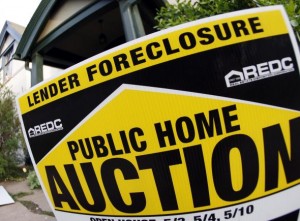Latest Blog Post
Things to Consider When Investing in Tax Deeds (Part II)
Determine A Method To Use
Make up your mind on how much time you can give for investing in tax deeds and your travel ability. These factors are significant when deciding a method to utilize to find properties to invest in. You can also attend several auctions just to observe so you can familiarize with the process and the rules.
To find out where the auction will be held and what time, call the county treasurer. You can also ask to know if there are properties that were not sold at the last auction and are available over-the-counter.
Do Evaluation
Assess the risks involved and know the fair market value. But do remember that the county appraiser can be a little too optimistic that it won’t matter for them if there are environmental or legal issues with the property title, after all, it’s a foreclosure property. A better idea is get an independent appraiser as it will save you money and stress.
If the property has legal issues, get a real estate attorney who is familiar with the local laws.
Specify your Search
Get a list of properties that are right and that fit you. You don’t have a lot of time to do extensive research on all of the properties you may be interested in so at least, utilize your time to concentrate on the best properties. The more time you dedicate to do due diligence, you will be able to understand the property’s market value better.
Attending the Auction
In your first time to attend the auction to buy properties, it is recommended to stand at the sideline and observe. The first part of the auction is where the most competitive bidding take place. Assess first what is happening before bidding.
Now if you are not able to get the property the first time, don’t take it too hard. Also, don’t panic that you are going to bid on any property even if you haven’t done homework just so you can purchase something.
Things to Consider When Investing in Tax Deeds
Planning to invest in Tax Deeds? Here are just a couple of things you’ll have to consider:
Your Objectives
You will need to find out your main financial goals even if you’re just starting out in tax deed investment. These objectives will make a significant impact on things such as – the property types you intend to buy, the areas you opt to invest, the techniques you apply when buying properties, and the work and time you will have to give. Are you purchasing tax deeds to possess and hold properties or just to sell and make profit from it? If your goal is to hold properties, you will have to consider that this will definitely need more capital. On the other hand, if you’re buying a property in order to sell it, this will need more time as you will usually have to go through remodelling.
Choosing the Area
Deciding where to invest is also deemed important when you are to buy tax deeds. You will have to take into consideration the unsuitable areas, city plans, development trends, potential growth, and get familiar with the local real estate values. You will also need to consider if it is rather best to invest in the state you are living. Remember, it is not easy to become an instant expert in all the states or counties you want to invest as rules and regulations vary. There are also counties where some of the areas are more investment-worthy than others. Usually, counties where there is less population tend to have less competition for tax deeds that are of quality.
The Property Type
Next is to choose the property type. You can opt for single family homes, multi-family residences, commercial properties, raw lands, industrial properties, developed lots, and agricultural land. The least risk for investment are usually developed lots and residential properties and they make the best choice for starting investors. Raw land may be vacant for a long time but may still do not have roads, sewer, or even water while commercial and industrial areas tend to require higher front capital yet have more environmental issues.
When Redemption Period Has Expired
What do you do when redemption period has expired? If the lien has not been redeemed, you as a lien buyer will have to do one of the following in the list below, depending on the jurisdiction.
* In some jurisdictions, you need to apply for a tax deed and give evidence that you have advised all the parties of interest.
* In others, the application for tax deed includes a number of other prerequisites that you must accomplish as part of the process. Again, it is your obligation to know the requirements.
* Other jurisdictions need that you foreclose on the property based on the tax lien. Where the foreclosure is needed, you must always have knowledgeable counsel for this process.
The process of perfecting your ownership interest based on the tax lien will depend by state and it is extremely important that it is done wisely and properly. Remember that the courts can be reluctant to just give off one’s property to someone else and they will tend look for reasons to prevent doing so.
How to Check the Land Deed
When checking the land deed, make sure that the description always comprise of the following details:
1.) Point of Beginning (POB)
This should be permanent, well-referenced, and identifiable. One thing to take note is the SPC (state plane) which is the coordinates of this point. Make sure that it is always given – known or even computable.
2.) Definite Corners
You also need to make sure that the parcel corners should be clearly defined points and these are usually marked by 1″ iron pipes with coordinates.
3.) The property sides’ lengths and directions
The lengths are in feet and decimals or it can also be in metric units. The directions are by true bearings or the azimuth angles have to be stated to allow misclosure error computation. A misclosure error is where there is measurement errors with the direction and distance needed to close the loop. The survey date is then needed and significant if the bearings are referred to magnetic north.
4.) The names of the adjoining property owners
It is also helpful for you to learn the names of the adjoining property owners so as to settle disputes over the property.
5.) Areas
Usually, the included area is provided as a valuation and identification aid. In rural land, the areas are in hectares or acres while lands in the city are given in square meters or square feet.
Click The Limited Time Offer At The Top Right To Claim Your Free Training System ($77 Value)
Basic Steps in Due Diligence
Due Diligence is considered to be one of the most vital parts when opting to purchase property tax lien or tax deed sales. When you do due diligence, you will be able to decide which properties you would like to bid on at county tax sales. So here are the three basic steps in due diligence you can follow to ensure success:
1. Acquire the list of properties. To get the list, you can do the following:
-Contact the taxing jurisdiction. There are times that your local jurisdiction will supply you with the property list but not all counties do this.
-Your local newspaper. The law requires counties to publish tax sale list information. The problem is the list at the newspaper can be a little hard to use.
-A list source in the internet that can give you the list of properties in Excel form which will naturally save you a lot of time.
2. Remove properties in your list that you are not interested in.
– Type of property: Eliminate all property types (commercial, home, land, multi-use, etc.) that you have no interest with.
-The lien amount. Remove the property lien values that do not meet your financial demands.
-The lien to value ratio: If you have already assessed your property values, you will be able to find out the lien to value percentage. Remove all those properties that does not meet your own criteria.
-Your own standards: Eliminate all those properties that do not meet your own standards (areas, zip codes,etc.)
3. Get all the details on the properties that you are interested in:
-Visit the website or the Assessor’s office as they can give you important details about the properties.
-You can use commercial programs such as Data Quick, Lexus Nexus, First America Real Estate Services, etc. These programs will require payment but they are not really needed but if you do have extra money for these services, these programs will definitely save you time.
-Check the property. You can do it online, in person, or even ask someone to do it for you. Remember, you don’t have to always check the properties in person.
-Rate the properties. You can follow a rating system from a professional or make your own system.
Click The Limited Time Offer At The Top Right To Claim Your Free Training System ($77 Value)
Losing Tax Lien Certificates
 Always remember: Do Not Lose Your Tax Lien Certificates.
Always remember: Do Not Lose Your Tax Lien Certificates.
Here is a list of reasons why you definitely do not want to experience losing tax lien certificates.
1.) Take note that a tax lien certificate is a negotiable document and it could subject to all risks – it can be sold, redeemed, and forged.
2.) Losing your tax lien certificate will very cost you more money. You will need to have it replaced and in some cases, you will need to go to court to have it replaced. The expenses involved in this would somehow eliminate all the money returns you are going to get.
3.) There are also jurisdictions for losing tax certificates wherein you have to post a bond to acquire a duplicate certificate.
So whenever you did get to purchase tax lien and tax deed certificates, always have them secured, keep them in a safe place, and never ever lose them.
The Tax Sale Process
 What happens in most tax deed sales? Usually, the auctioneer reads off the list of properties that are to be bid up the bidders. But for counties that hold online tax deed sales, the bidder must register online and then place a deposit first before he is allowed to bid. Properties are commonly listed by batches and there is a specific time to be given for each of these batches. You bid on the properties you are interested in and you’ll only know if you are the successful bidder after the sale.
What happens in most tax deed sales? Usually, the auctioneer reads off the list of properties that are to be bid up the bidders. But for counties that hold online tax deed sales, the bidder must register online and then place a deposit first before he is allowed to bid. Properties are commonly listed by batches and there is a specific time to be given for each of these batches. You bid on the properties you are interested in and you’ll only know if you are the successful bidder after the sale.
Now tax lien sales differ for each states. States such as Arizona, Florida, and Illinois, have their interest rate bid down. In some, the tax lien is bid up while the interest rate is constant. A “premium” is the amount that is bid up from the due amount. It is also called an overbid. Some states such as Indiana and Alabama provide you interest on the premium that is paid for the tax liens while states like West Virginia does not. Now for Colorado and Vermont, you do not need to pay interest on the premium and you also get to keep the premium even if the tax lien will be redeemed. It is only in New Jersey where you can bid down the interest rate to zero. You will not get an interest on the premium, however, you will get the premium back if the tax lien will be redeemed within five years.
There are states that you are to bid down on the percent ownership interest of the property if the tax lien would be foreclosed. The bidder who accepts the lowest percent ownership interest on the property will be awarded the tax lien certificate. Nebraska, Iowa, Rhode Island, and Louisiana use this procedure.
In awarding tax lien certificates, there are states that follow either random selection or the round robin process. In random selection, the auctioneer selects the bidders in random as he reads out at the sale. With round robin process, the auctioneer will have to go around the room to offer the next property on the list to the next bidder. With these processes, it is hard to do due diligence on the properties and you can only either accept or decline the properties that are being offered to you.
Steps in Protecting Your Tax Lien and Tax Deed Investment
 What do you do to protect your tax lien investment? Below are useful tips in ensuring your investment is profitable:
What do you do to protect your tax lien investment? Below are useful tips in ensuring your investment is profitable:
1. Have your tax lien or tax deed recorded in the county because it may prove to be worthless if the county records don’t have it listed. This task is done for you in many states but just make sure to have it listed right away. You may have to wait for the tax certificate and when you do get a hold of it, you will then need to send the original document that comes with a recording fee to the county records office. The fee may differ from each county or state. To know the exact fee on how much you have to send, call the county clerk or recorder. There’s a possibility that the documents will be returned to you if you don’t send the right payment.
2. Make a copy of the tax deed or tax lien certificate before you have it recorded.
3. Send the tax certificate with a return receipt through certified mail. By doing this, you will have proof of sending the document if in case it gets lost and you can just have it replaced. Take note that the recording process may take some time and if anything goes wrong with the sending or receiving process, you still have another certificate copy.
4. Place the document in a secured place once you receive it from the county records. You will have to present the signed document to be able to receive redemption from the tax certificate.
5. Make sure that the redemption amount is exactly the same amount that is due before signing and handing it over to the tax collector.
6. To have all your recording fees, tax payments, and other extra expenses accounted for, provide affidavit for all these payments to the tax collector.
Making Profit with Tax Liens
 When purchasing tax deeds, you would want to make profit by having the property sold or rented. But it’s not the case for tax liens, there are three ways that you can make profit from these certificates. What are they? Read on to find out.
When purchasing tax deeds, you would want to make profit by having the property sold or rented. But it’s not the case for tax liens, there are three ways that you can make profit from these certificates. What are they? Read on to find out.
First, you get money when the lien reaches its redemption period. When the owner of the property redeems the lien, you will be paid the amount of the lien plus the interest and penalties. Many states have the interest rate as the annual rate so the longer you hold the tax lien, the more money you will receive during redemption.
Let’s move on to the second method. When the redemption period is finished and the tax lien has not been redeemed, you can then begin foreclosure on the property so you will be paid. The process may be simple or it can be complicated, depending on the state. There are states wherein you would have to go through the process with a lawyer which you will have to spend much cash and may take time. Now, there are also states wherein it’s easier since you just need to do petition at the county court or do the application process in getting the property’s deed. But if the property needs to go through foreclosure sale, there are chances wherein you may not be able to get the property since it will go to the highest bidder at the sale but you will still be paid for the lien.
The third process involves assigning the tax lien to another investor. There are states that allow assignment or tax lien certificate sale to another investor. With this, you don’t have to go through foreclosure process. Though you may not end up with the property with this method, you will still be able to collect profit sooner.
Is Your Tax Lien Investment Profitable?
 Just how profitable is your tax lien investment? If you’re not sure how to check that information, this article will give you helpful tips on how to know how profitable you are.
Just how profitable is your tax lien investment? If you’re not sure how to check that information, this article will give you helpful tips on how to know how profitable you are.
First off, enter in all tax liens into a spreadsheet or any other software program and then index them according to tax ID and county. Place in the interest rate and the certificate amount. Also put in the paid premium. You will then have to have a formula that will calculate the interest that is due and the penalty amount. Now these formulas will need to consider the days lapsed since buying the tax lien certificate. Make sure that you can check the subsequent taxes along with the interest paid. You will have to learn the method of tracking down all expenses – those that have been reimbursed during the redemption period and those that have not.
So how do you calculate? Take the interest and due penalties of both subsequent taxes paid and certificate amount and then add it to the original certificate amount investment plus subsequent taxes that are paid plus reimbursed expenses during redemption period. The total would be the amount that you will be paid once your lien certificate will be redeemed. If you subtract the total investment amount from this number, the total investment is what you have paid for the lien certificate plus subsequent taxes that you have paid plus both reimbursable and non-reimbursable expenses connected to the lien certificate. This would be your profit. Now, when you have your profit amount, you can then calculate the yield or the percent yield for each tax lien certificates that you have. To get this information, you must divide the profit by the total investment. To convert this to a yearly yield, you must know the days the tax lien was being held for. Then multiply the yield by 365 and divide by the number of days that you have hold on to the certificate.
Just remember that for every state, the calculations for the interest and penalties will be different so you might need another spreadsheet or software program for every state that you invest in.
Click Here To Get Your Free Tax Lien Training System ($77 Value)
- Exactly How To Start Buying Tax Liens Today
- Tips For Tax Lien Auction Success
- How To Avoid The Mistakes New Tax Lien Investors Make

Search
Categories
Archives
- July 2015
- June 2015
- May 2015
- April 2015
- March 2015
- February 2015
- January 2015
- December 2014
- November 2014
- October 2014
- September 2014
- August 2014
- July 2014
- June 2014
- May 2014
- April 2014
- March 2014
- February 2014
- January 2014
- December 2013
- November 2013
- October 2013
- September 2013
- August 2013
- July 2013
- June 2013
- May 2013
- April 2013
- March 2013
- February 2013
- January 2013
- December 2012
- November 2012
- October 2012
- September 2012
- August 2012
- July 2012
- June 2012
- May 2012
- April 2012
- March 2012
- August 2011
- July 2011
- June 2011
- May 2011
- April 2011
- March 2011
- February 2011
- January 2011








